You can transform everyday items into eco-friendly soap molds using natural fiber materials like bamboo and hemp, or by repurposing cardboard boxes, milk cartons, and glass containers. Wood molds made from untreated hardwoods offer durability, while natural clay vessels provide unique design options. For zero-waste solutions, try converting food containers like Pringles cans or yogurt tubs. Exploring sustainable mold alternatives will help you create beautiful soaps while protecting the environment.
Natural Fiber Molds From Bamboo and Hemp
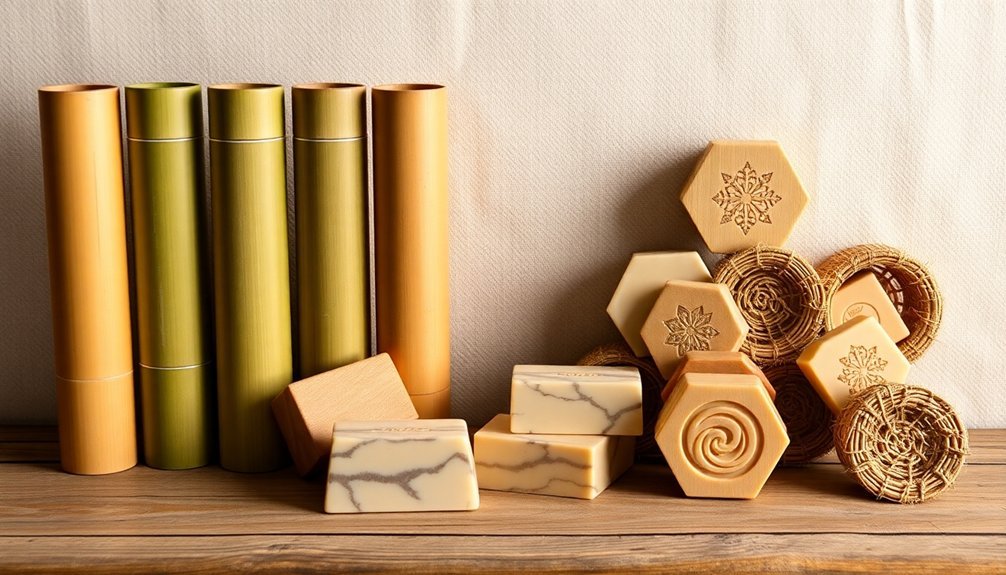
Crafters seeking sustainable alternatives will find bamboo and hemp molds to be game-changers in eco-friendly soap making.
You'll appreciate how these natural fiber options provide durability while maintaining their shape during the soap-making process, even at high temperatures.
Bamboo molds offer built-in antimicrobial properties and a lightweight design that's perfect for both beginners and experienced crafters.
Natural, lightweight bamboo molds bring antimicrobial benefits to soap crafting, making them an ideal choice for artisans of all skill levels.
Hemp fiber molds complement your sustainable practices by being fully compostable after they've served their purpose.
Both options create distinctive textures that'll make your soaps visually appealing while reducing plastic waste.
You're not just getting practical tools – you're investing in biodegradable solutions that align with eco-friendly crafting trends.
These natural molds prove that you don't have to compromise quality when choosing environmentally conscious soap-making supplies.
Recycled Cardboard and Paper-Based Options
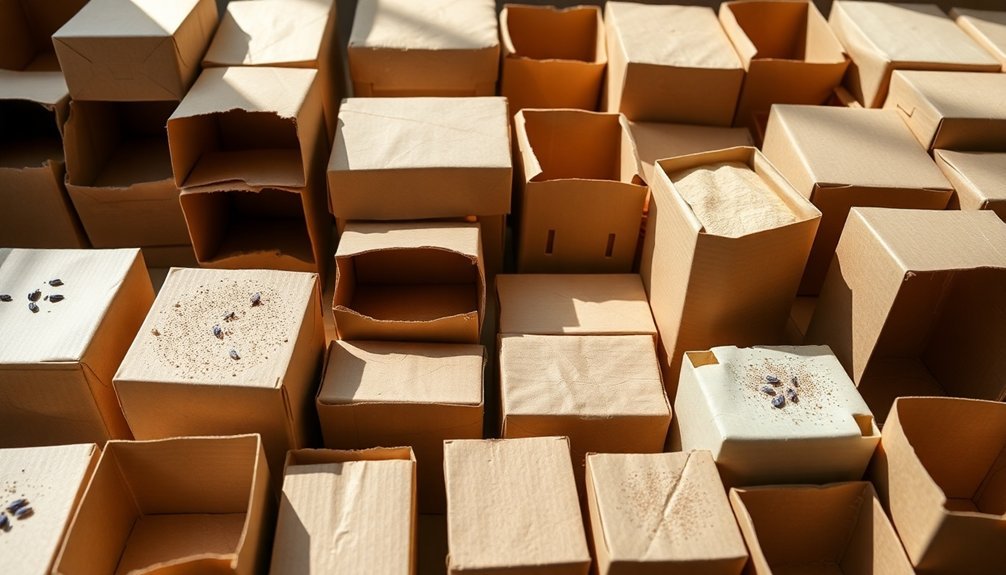
Three everyday household items – cardboard boxes, milk cartons, and egg cartons – offer innovative solutions for eco-conscious soap making.
You'll find these recycled cardboard boxes and paper-based options are perfect for creating unique soap molds. Simply line pizza boxes or shipping containers with plastic wrap for easy soap removal, or transform milk cartons into molds by cutting and resealing them.
- Repurpose pizza and shipping boxes by adding a protective liner
- Convert milk cartons and juice boxes into uniquely shaped molds
- Use egg cartons for creating mini soaps and decorative embeds
- Transform take-out containers into fun-shaped soap molds
These budget-friendly alternatives help reduce waste while giving you creative freedom in your soap-making journey.
You'll discover that these everyday items can produce professional-looking results without the need for expensive commercial molds.
Repurposed Glass Container Solutions
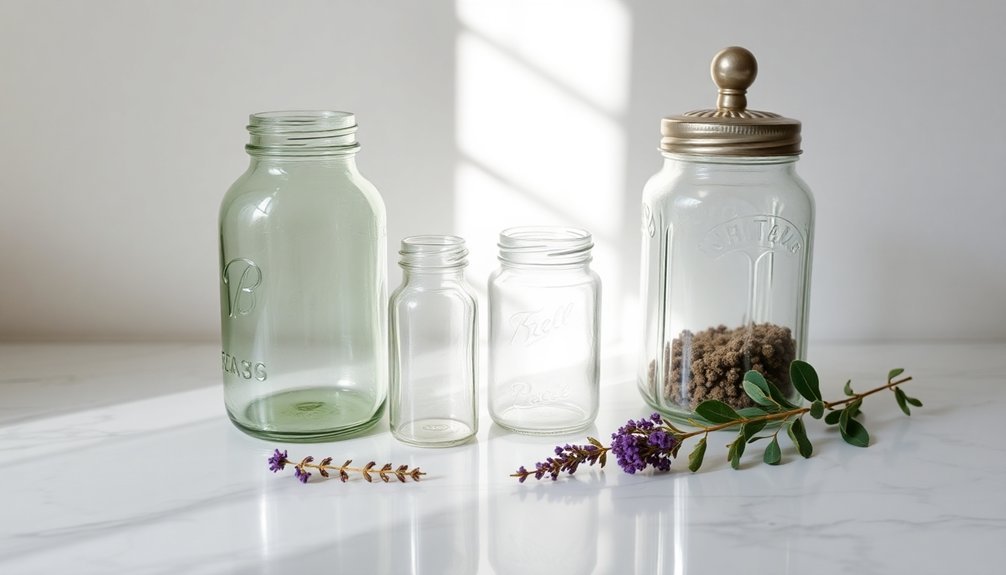
While cardboard options offer disposable convenience, glass containers provide a more durable and long-lasting alternative for eco-friendly soap molds.
You'll find that repurposed glass containers, like old jars and bottles, offer unique shapes and sizes for creating distinctive soap designs.
Glass's non-porous nature prevents your soap from absorbing unwanted odors, making it perfect for soap making.
Choose glass containers for soap making – their non-porous surface keeps your soap pure and free from unwanted scents.
Before pouring your mixture, line the container with parchment paper or apply a mold release spray to guarantee easy removal.
Just make sure your chosen glass can handle the heat of melted soap to avoid cracking.
The best part? You can clean and reuse these containers for future soap batches or other crafting projects, reducing waste and supporting sustainable practices in your DIY soap-making journey.
Sustainable Wood Mold Alternatives
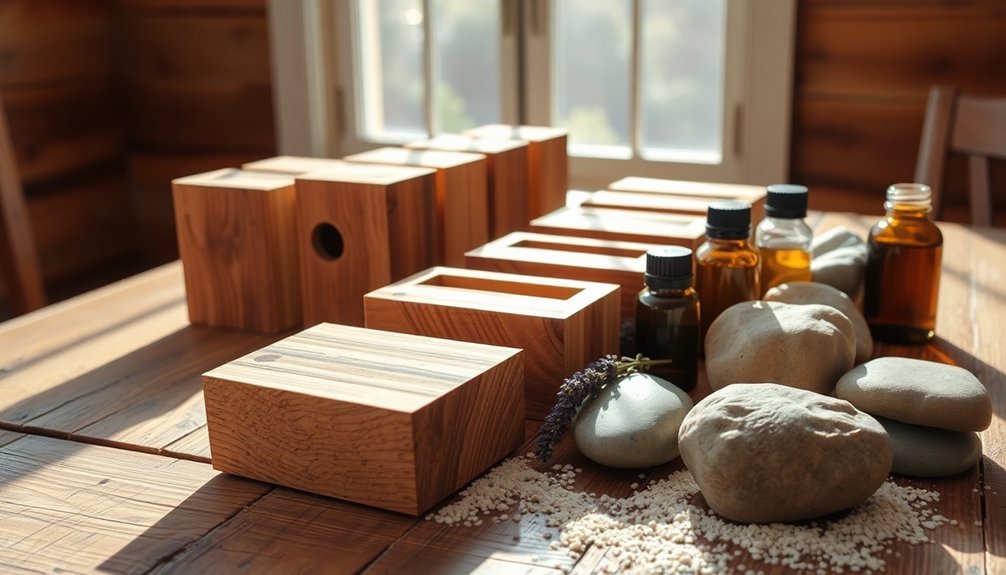
When considering eco-friendly soap molds, sustainable wood alternatives stand out as an elegant and practical choice.
You'll find that untreated hardwoods offer a durable, biodegradable option that won't leach harmful chemicals into your soaps. These sustainable wood molds can be easily customized to create unique shapes while maintaining their integrity through multiple uses.
- Responsibly sourced hardwoods provide long-lasting performance without environmental compromise
- Line your wooden molds with grease-proof paper for easy soap release and mold preservation
- Reclaimed wood adds character to your soap-making process while promoting sustainability
- Untreated pine or cedar allows for custom sizing and natural decomposition at end-of-life
Biodegradable Plant-Based Materials
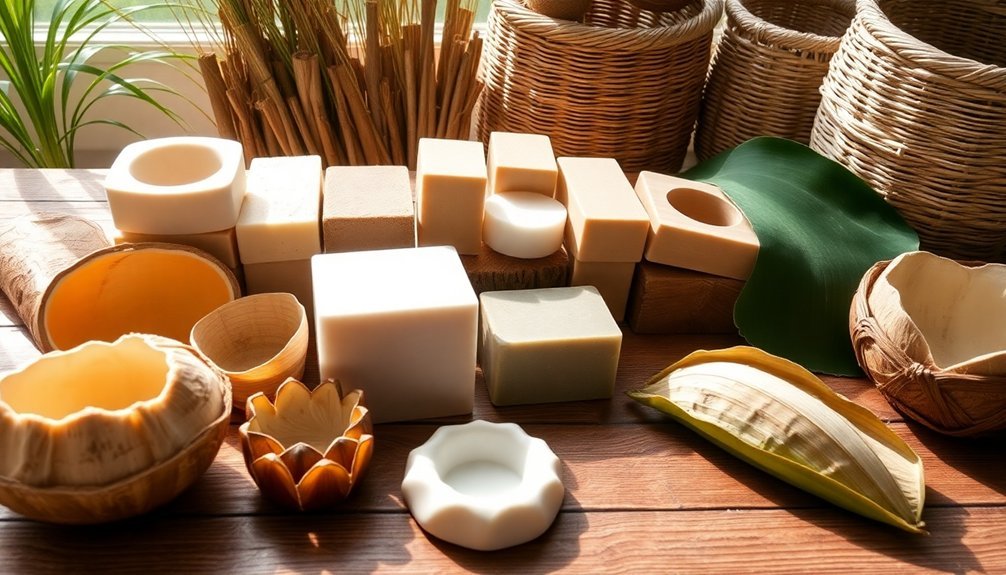
Beyond sustainable wood options, biodegradable plant-based materials offer innovative solutions for eco-conscious soap makers. You'll find several natural materials that can transform your soap-making process while reducing environmental impact.
| Material | Benefits | Decomposition |
|---|---|---|
| Bamboo | Fast-growing, durable | 2-3 years |
| Cornstarch Plastic | Moldable, versatile | 3-6 months |
| Sugarcane Bagasse | Repurposed waste, sturdy | 1-2 months |
You can choose from options like pressed paper pulp molds that break down easily or coconut shells that create unique designs while utilizing industry byproducts. These eco-friendly soap molds not only support sustainable practices but also provide practical alternatives to conventional materials. Whether you're using cornstarch-based plastics or bagasse, you're contributing to waste reduction while crafting your soaps.
Upcycled Kitchen Container Ideas
Rather than purchasing new molds, you'll find countless soap-making possibilities right in your kitchen cabinets.
Look no further than your own kitchen for budget-friendly soap molds – creative solutions await in everyday containers.
These upcycled kitchen container ideas transform everyday items into eco-friendly soap molds while reducing waste. Food containers you'd typically discard can create unique shapes and sizes for your homemade soaps.
- Empty Pringles cans lined with freezer paper make perfect cylindrical molds that you can customize to any height.
- Wax-lined juice boxes and milk cartons offer sturdy molds that you can easily peel away once your soap sets.
- Small yogurt pots and pudding cups create individual-sized soaps with distinctive shapes.
- Candy and snack containers provide unconventional mold options for creative designs.
Long-Lasting Silicone Mold Options
You'll find silicone molds offer unmatched durability for your soap-making journey, withstanding countless uses while maintaining their shape and non-stick properties.
These versatile tools come in an array of creative designs, from basic rectangles to intricate patterns that'll make your handmade soaps stand out.
Though the initial cost may be higher than disposable alternatives, you're making a smart investment that'll pay off through years of consistent use and professional-quality results.
Durable Silicone Mold Benefits
When considering environmentally conscious soap making, durable silicone molds stand out as an exceptional investment. You'll find these eco-friendly tools are built to withstand extreme temperatures from -40°F to 446°F, making them perfect for various soap-making techniques.
Their flexible nature eliminates the need for disposable liners, reducing waste while guaranteeing your soaps release easily.
- Non-toxic materials guarantee safe, sustainable soap production
- Reusable design lasts for years, minimizing environmental impact
- Easy cleaning in dishwashers reduces chemical cleaner usage
- Versatile shapes and designs enhance creativity without compromising sustainability
The durability of silicone molds transforms your soap-making hobby into a more sustainable practice.
You'll appreciate how these molds maintain their quality through repeated use while supporting your commitment to eco-friendly crafting methods.
Cost-Effective Long-Term Investment
Investment wisdom favors silicone soap molds as a smart financial choice for both beginners and experienced crafters. You'll find these cost-effective tools deliver exceptional value through their outstanding durability and consistent performance.
Quality silicone molds withstand temperatures up to 450°F without warping or cracking, ensuring you won't need frequent replacements. Their flexible design makes soap removal effortless, eliminating the need for additional lining materials and saving you money over time.
These eco-friendly molds are crafted from non-toxic materials, protecting both your soap quality and the environment.
You'll appreciate how silicone molds improve your soap's appearance by promoting even gelling and preventing common issues like soda ash.
When you factor in their long lifespan and superior results, investing in high-quality silicone molds proves to be a financially savvy decision for your soap-making journey.
Creative Shape Possibilities
Crafting distinctive soaps becomes effortless with silicone molds that offer an extensive range of creative shapes and designs.
You'll find eco-friendly silicone soap molds that transform your creations into eye-catching pieces while maintaining the quality of your skincare products. These versatile molds let you experiment with various designs, from intricate patterns to simple shapes, making each batch unique and personalized.
- Create stunning floral soaps with detailed petal patterns and natural textures
- Design geometric shapes for modern, minimalist soap collections
- Craft whimsical animal-shaped soaps perfect for children's bathtime
- Produce professional-looking bars with classic rectangular or oval designs
The non-toxic nature of silicone guarantees your creative vision doesn't compromise the soap's integrity, while the material's flexibility makes unmolding your artistic creations a breeze.
Natural Clay and Ceramic Vessels
Natural clay and ceramic vessels stand among the most sustainable options for eco-conscious soap makers. You'll find these eco-friendly soap molds offer remarkable versatility while reducing your environmental impact.
Natural clay molds can be easily shaped by hand or with basic tools, allowing you to create unique designs that reflect your creative vision.
Ceramic vessels provide exceptional durability and non-toxic properties, making them perfect for withstanding the soap-making process's high temperatures.
When working with either material, you'll need to guarantee proper sealing or glazing to prevent moisture absorption and make soap removal easier.
Both options let you customize sizes and shapes to match your specific needs while contributing to sustainable crafting practices.
Reclaimed Metal Container Choices
Your kitchen's discarded metal containers can transform into perfect soap molds, with clean food tins, metal tea containers, and vintage cookie boxes offering sturdy, heat-resistant options.
You'll find these reclaimed items particularly effective for soap making, as their thermal properties help maintain consistent temperatures during the saponification process.
When choosing your metal containers, look for rust-free pieces with smooth surfaces, and remember to line them with parchment paper to guarantee easy soap removal.
Clean Food Tins
Three readily available items in every kitchen can become valuable tools for soap making: clean food tins.
You'll find that these repurposed containers make excellent eco-friendly soap molds, offering durability and versatility for your DIY projects. Their metal construction can handle hot soap mixtures without warping, and they're perfect for creating unique shapes.
- Remove all labels and thoroughly clean the tins to guarantee contamination-free soaps
- Line the inside with freezer or parchment paper for easy soap removal
- Choose from various sizes, from small tomato paste tins to large soup cans
- Reuse the tins multiple times, reducing waste while crafting
Metal Tea Containers
When seeking sustainable soap molds, metal tea containers offer an excellent alternative to store-bought options.
You'll find these reclaimed materials particularly useful for creating uniquely shaped soaps while supporting eco-friendly practices.
These cylindrical eco-friendly soap molds provide several advantages for your soap-making projects. Their excellent heat conductivity helps achieve proper gelling, resulting in higher quality soaps.
You'll appreciate how easily the hardened soap releases from the metal surface, making unmolding a breeze.
Whether you're crafting small batches or larger quantities, you can find metal tea containers in various sizes to suit your needs.
Vintage Cookie Boxes
Another innovative option alongside metal tea containers is vintage cookie boxes, which offer distinctive shapes and patterns for your soap-making adventures.
These eco-friendly soap molds provide durability while helping reduce waste through creative repurposing. You'll find these reclaimed metal containers particularly useful when lined with parchment or freezer paper, ensuring your soaps release easily.
- Transform intricate embossed designs from vintage cookie boxes into unique soap textures
- Choose from various sizes and shapes to create custom soap collections
- Support sustainable crafting by giving old metal containers a new purpose
- Save money while adding character to your handmade soaps
The embossed patterns and classic designs of vintage cookie boxes add an extra layer of charm to your finished soaps, making them perfect for gifting or selling.
You're not just creating beautiful soaps; you're participating in eco-conscious crafting.
Compostable Packaging Conversions
Making the switch to compostable packaging represents a pivotal step in sustainable soap making. You'll find that compostable packaging conversions offer an effective way to reduce your environmental footprint while meeting growing consumer demand for eco-friendly solutions.
By choosing compostable molds made from plant-based materials, paper, or cardboard, you're actively participating in waste reduction.
When selecting eco-friendly packaging, look for ASTM D6400 certification to guarantee your materials will properly decompose in commercial composting facilities. These certified options break down naturally, unlike traditional plastic molds that persist in landfills for centuries.
You're not just creating beautiful soaps – you're contributing to a circular economy where materials return to the earth, making your soap-making business more sustainable while appealing to environmentally conscious customers.
Zero-Waste Storage Solutions
You'll find endless storage possibilities by transforming everyday food containers into soap molds, from yogurt cups to take-out boxes that would otherwise end up in landfills.
Natural fiber storage boxes made from bamboo or recycled cardboard offer sturdy, breathable options for curing and storing your finished soaps.
Glass jars present another sustainable choice, as they're infinitely reusable and allow you to monitor your soaps' appearance while protecting them from moisture and dust.
Reusing Household Food Containers
While reducing plastic waste remains a crucial environmental challenge, your kitchen cabinets likely contain perfect soap mold solutions. You can easily repurpose common food containers into eco-friendly soap molds, giving them a second life before they reach the landfill.
These everyday items offer practical and cost-effective alternatives to commercial molds.
- Pringles cans create smooth, cylindrical soaps with minimal preparation
- Wax-lined juice boxes and pudding cups prevent sticking and enable easy removal
- Yogurt containers and butter tubs work perfectly for standard-sized bars
- Take-out boxes provide versatile rectangular mold options
The preparation process couldn't be simpler – just clean your chosen container, verify it's completely dry, and it's ready for soap making.
You'll save money while contributing to zero-waste practices, making your DIY soap projects both creative and environmentally conscious.
Natural Fiber Storage Boxes
Beyond kitchen containers, natural fiber storage boxes offer another innovative approach to eco-friendly soap making.
You'll find these sustainable molds, crafted from materials like jute, hemp, and bamboo, are perfect for creating handmade soap while minimizing environmental impact.
These natural fiber storage boxes serve dual purposes – you can repurpose them from food packaging and transform them into eco-friendly soap molds.
They're particularly effective because their sturdy construction handles the heat from soap-making while maintaining proper airflow.
You'll appreciate how their distinct textures and patterns create unique designs on your finished soaps, adding visual appeal to your creations.
Glass Jar Alternatives
Since sustainability remains a top priority for eco-conscious crafters, glass jar alternatives offer an innovative approach to soap mold design.
You'll find that glass jars serve as perfect eco-friendly soap molds, providing a sturdy and reusable option for your handmade soaps. By lining them with parchment paper, you can easily remove your finished products while maintaining the jars' integrity for future use.
- Glass jars withstand high temperatures, making them ideal for hot process soap making
- Repurposed jars reduce waste and eliminate the need for single-use plastic molds
- Various jar sizes allow you to create different soap shapes and dimensions
- Clean, recycled jars double as storage containers for your soap-making ingredients
You're not just creating beautiful soaps – you're contributing to a zero-waste lifestyle by choosing these sustainable containers for your craft.
Frequently Asked Questions
What Can I Use in Place of Soap Molds?
You can use take-out boxes, milk cartons, Pringles cans, silicone cupcake molds, and plastic food containers as soap molds. They're readily available, easy to line, and allow for simple soap removal.
How to Set Soap Without Mold?
You can line cardboard boxes with plastic wrap or parchment paper, or use household items like ice cube trays, muffin tins, or milk cartons. Make sure they're clean and properly lined for easy removal.
What Can I Use Instead of Mold?
You can use everyday items like milk cartons, yogurt containers, or silicone baking trays. Line cardboard boxes with parchment paper, or repurpose Pringles cans. These alternatives work great for shaping your soap projects.
What Is the Best Material for a Soap Mold?
You'll find silicone is the best material for soap molds. It's flexible, non-stick, and durable. If you're making larger batches, wooden molds are great too, though they'll need lining for easy release.
In Summary
Making your own eco-friendly soap molds doesn't have to be complicated. You've got plenty of sustainable options right in your home – from repurposed cardboard boxes to natural bamboo containers. By choosing materials like reclaimed wood, biodegradable plant fibers, or recycled glass, you're reducing waste while creating beautiful soaps. Remember to clean and prep your chosen molds properly, and you'll be ready for your next soap-making project.
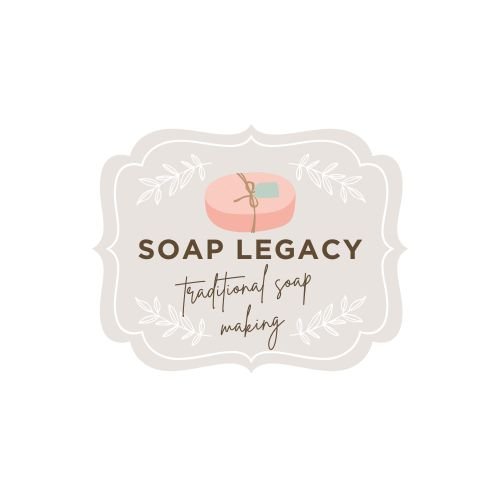
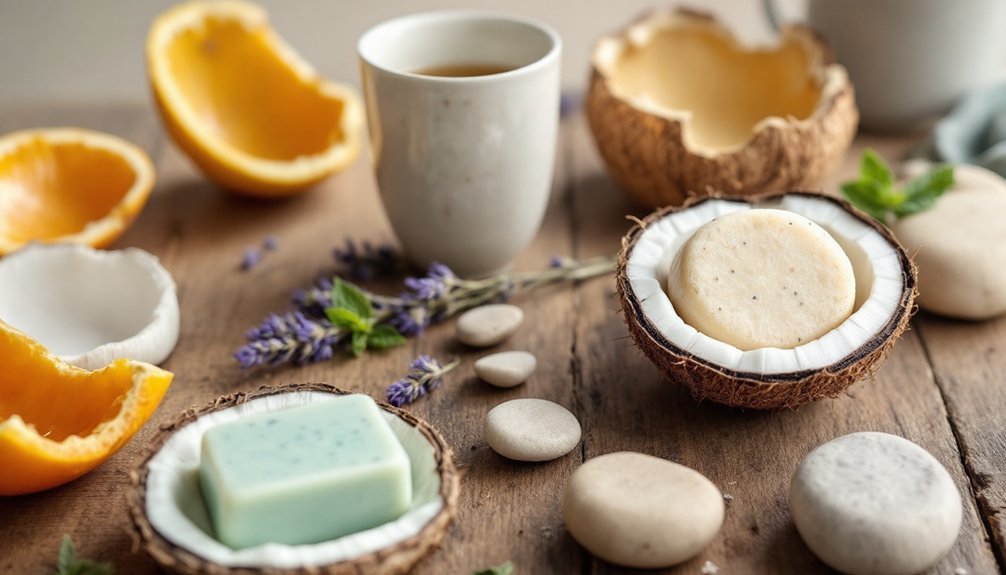
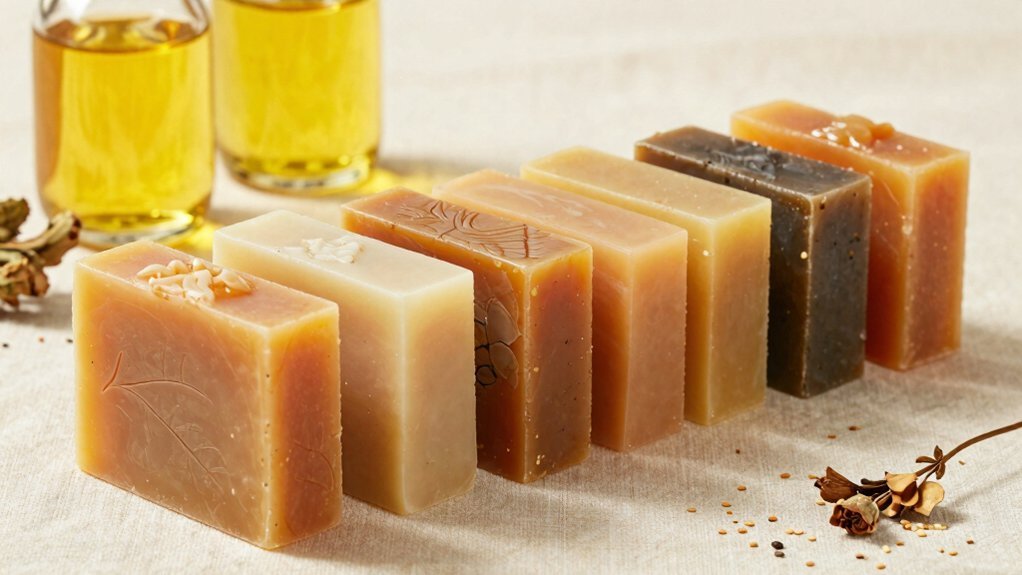
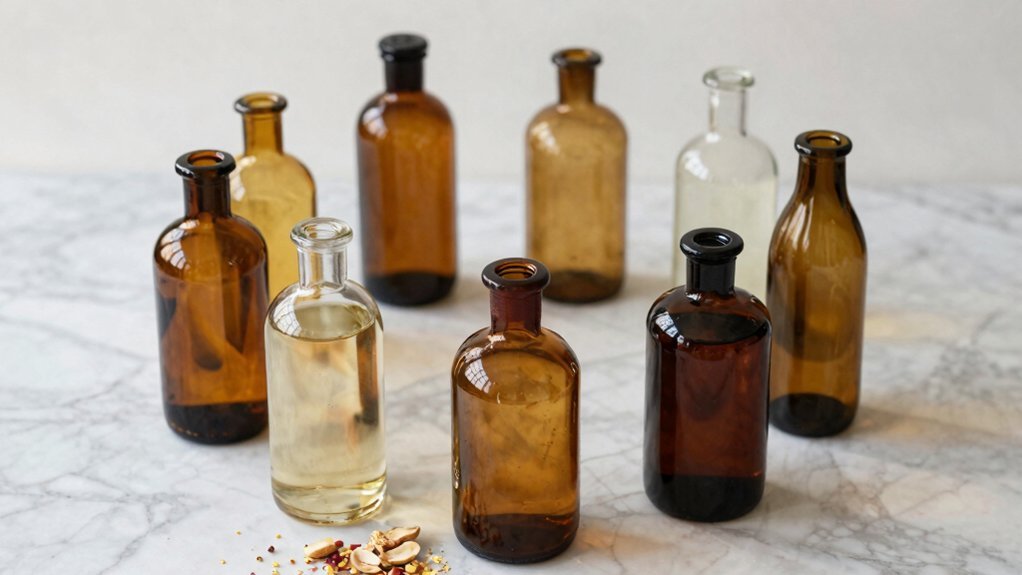
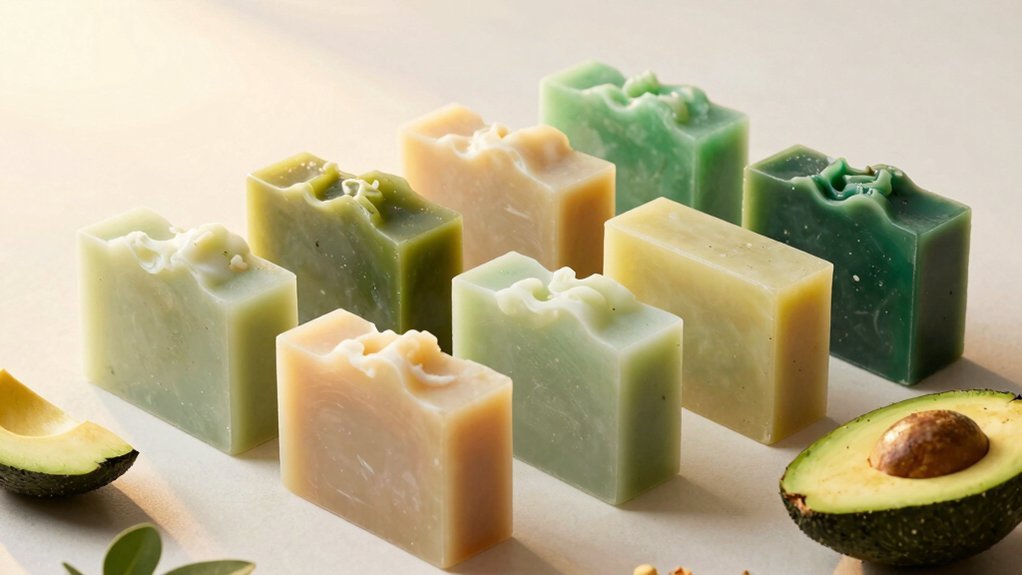
Leave a Reply